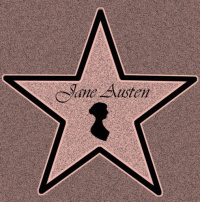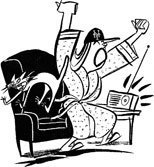Marcy Sheiner's Blog, page 10
November 11, 2013
Veterans Day / Armistice Day
ar·mi·stice [ahr-muh-stis] noun
a temporary suspension of hostilities by agreement of the warring parties; truce
from Dictionary.com Unabridged /
Based on the Random House Dictionary, © Random House, Inc. 2013.
Call me a nitpicker—on second thought, call me what I am: a compulsive editor overly attached to precise use of language—but it’s always bothered me that the name of this day was changed from Armistice to Veterans Day. Check out the above definition: armistice has an intense, clear-cut meaning. The government dumped it, though, on June 1, 1954, when I was too young to notice—yet I have a vague memory of celebrating Armistice Day prior to that time. (At five or six years old!). Anyhow, while “Armistice Day” still holds in France, Belgium and New Zealand, most countries, including the U.S., changed it after World War II.
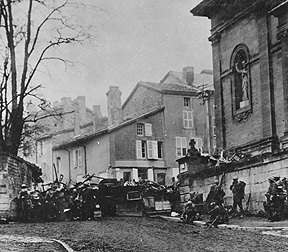
Taken at 10:58 a.m., on Nov. 11, 1918, just before the Armistice went into effect; men of the 353rd Infantry, near a church, at Stenay, Meuse, wait for the end of hostilities. Photo from Wikipedia
The day originally marked the armistice signed between the Allies of World War I and Germany for the cessation of hostilities on the Western Front of that war. It took effect at 11:00 a.m.—the “eleventh hour of the eleventh day of the eleventh month” of 1918. (Don’t you just love that?) WWI was called, at the time, “the war to end all wars” and the treaty was considered the Great Armistice, since there wouldn’t be any more “great” wars. Ahem.
World War II proved the fallacy of this train of thought. That momentous conflict required the greatest mobilization of soldiers, sailors, Marines and airmen in the nation’s history up to then; and after American forces fought in Korea, the 83rd Congress, at the urging of veterans service organizations, amended the Act of 1938 by striking out the word “Armistice” and inserting in its place the word “Veterans.” With the approval of this legislation (Public Law 380) November 11th became a day to honor all American veterans, whether living, dead in action, or deceased from other causes.
Now the official national remembrance of war dead is Memorial Day, originally called “Decoration Day,” derived from the practice of decorating soldiers’ graves, begun immediately after the American Civil War.
And if you can keep all this straight you’re a better citizen than I—but then, I decided some time ago I ain’t gonna study war no more.
I always wondered if Paul Simon’s song Armistice Day expressed sentiments similar to mine, but the lyrics don’t reflect this. Then again, Simon’s written plenty of songs that seem to be about one thing and aren’t, or so he says: when he cut the album Graceland, in which he sounds like he’s rejoicing on his way to that iconic place, he told interviewers the song had nothing to do with the Elvis Presley mega-mansion. Okaaaay. Here’s the chorus from Armistice Day.
Armistice Day (Chorus)

Paul Simon
Photo: Lyrics.com
Armistice Day
Armistice Day
That’s all I really wanted to say
Oh I’m weary from waiting
in Washington DC
I’m coming to see my Congressman
but he’s avoiding me.
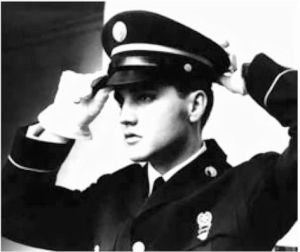
A veteran to remember
Well, that is obviously a song about the Easter bunny! And Graceland, I just figured out, is an ode to The North Pole.
Changing Armistice to Veterans for the purpose Congress intended–to honor all vets–actually is precise use of language. I just wish they wanted to honor at least the concept of armistice somewhere along the way.
Related articles
The Eleventh Hour: “a day to be dedicated to the cause of world peace” (definedontdefend.com)
Armistice Day silence to take place (bbc.co.uk)
Filed under: Current Events, Politics Tagged: Armistice Day, Armistice with Germany, Paul Simon, Veterans Day, World War I, World War II

November 9, 2013
State of the Art: Writing and Publishing in the 21st Century
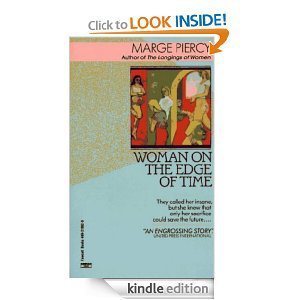 One of my favorite books in the groundswell of feminist writing that emerged from the 1970’s Women’s Movement was Marge Piercy’s Woman on the Edge of Time. Residents in the Utopia of the story spent a good deal of their time and lives making art via paint, pottery, poetry, etc. I carried that vision with me into the future, and created my own literary art in between raising children and making a living with my typing fingers. I used to think it would be lovely if everyone was able to make a movie if they so desired; I myself wanted to turn one of Doris Lessing’s space fiction novels into a film. I didn’t want a career in The Industry, didn’t even want to make more than one movie; I just wanted to create this one little project for my own amusement. I raged against the injustice of a culture in which only an elite group of people had access to the means of art production.
One of my favorite books in the groundswell of feminist writing that emerged from the 1970’s Women’s Movement was Marge Piercy’s Woman on the Edge of Time. Residents in the Utopia of the story spent a good deal of their time and lives making art via paint, pottery, poetry, etc. I carried that vision with me into the future, and created my own literary art in between raising children and making a living with my typing fingers. I used to think it would be lovely if everyone was able to make a movie if they so desired; I myself wanted to turn one of Doris Lessing’s space fiction novels into a film. I didn’t want a career in The Industry, didn’t even want to make more than one movie; I just wanted to create this one little project for my own amusement. I raged against the injustice of a culture in which only an elite group of people had access to the means of art production.
Well, I have lived to see the day that this one aspect of Utopia has actually come true. If I took the time to learn the iMovie program on my Macintosh, I could go ahead now and make my movie. I could even share it with others, via YouTube. More significant to my life and well-being, however, is that this democratic accessibility also exists for the creation of literature, or more specifically, book publishing.
I may have wanted to create one little movie, but I had far grander goals for my life’s work. I’ve always known what I wanted to do: to publish a novel that would be respected and well-critiqued by the literati, yet mainstream and popular, so the money earned would launch me into a writer’s life. I would live quietly somewhere—at various times I imagined myself in a Manhattan apartment, at other times in a modest oceanfront house—and I’d spend every day of my life in front of my IBM Selectric, on which my handwritten first draft would be typed and retyped through dozens of revisions—that’s how I used to do rewrites back in the Good Old Days.
I believed with all my heart what writers and teachers and books about writing told me: that if I kept at it, if I did it enough so I got better and better, one day IT would happen. I was coming from a literary tradition filled with anecdotes of rejection: writers like Ernest Hemingway and Henry Miller were said to keep a pile of dusty unpublished novels in their desk drawer. Marge Piercy’s first book, Small Change, was her sixth.
I plugged on.
 I wrote in between babies and one child’s brain surgeries, through divorce and household moves, a munchkin holding each hand. I wrote in between secretarial jobs, poverty, and food stamps; past used-car breakdowns, furnace failures and snowstorms; I kept on writing in between one crisis after another. I was forced to stop occasionally, for two months, six, four. I lost a job, got another; at times I cleaned houses; I nursed my post-surgical son, sent him back to school, and pounded out another bunch of words. Altogether I wrote six novels. I sent each one out to agents and editors. The only one that’s been published is the last: an ebook on Smashwords that to date has sold eight copies. Hell, I don’t buy ebooks, so how can I expect anyone to buy mine? Still, I did kind of expect my friends to buy it. One of them did.
I wrote in between babies and one child’s brain surgeries, through divorce and household moves, a munchkin holding each hand. I wrote in between secretarial jobs, poverty, and food stamps; past used-car breakdowns, furnace failures and snowstorms; I kept on writing in between one crisis after another. I was forced to stop occasionally, for two months, six, four. I lost a job, got another; at times I cleaned houses; I nursed my post-surgical son, sent him back to school, and pounded out another bunch of words. Altogether I wrote six novels. I sent each one out to agents and editors. The only one that’s been published is the last: an ebook on Smashwords that to date has sold eight copies. Hell, I don’t buy ebooks, so how can I expect anyone to buy mine? Still, I did kind of expect my friends to buy it. One of them did.
When I found out about Smashwords I was elated. The revolution is here! Hello, hooray, I’m ready, I crowed. Finally! Writers had seized the means of production! No more were the gatekeepers of literature young girls fresh out of college holding titles like Assistant Editor for glorified sectetarial jobs. No longer would a few behemoth corporations dictate what the public read. By now, as everyone knows, Smashwords isn’t the only game in town; these days, if you want to publish a book, the options are numerous. Free at last, free at last, great godamighty, we’re free at last!!!
Uh huh. Be careful what you wish for.
I find it difficult to pinpoint exactly what’s wrong, but I’m disheartened and depressed by the state of the art. I have gradually lost my once-burning desire to publish. The electronic format isn’t entirely to blame: I’ve learned to love my Kindle. And yet, being published electronically doesn’t feel quite real to me. It isn’t self-publication that bothers me: besides publishing a novel on Smashwords, I had an ebook collection of short stories published by Renaissance Books. I’ve never been good at self-promotion, and I find I’m even more reluctant to promote a series of bytes on a screen. There’s just something about it that doesn’t feel quite right. Future generations, should they read this, will be baffled. I’m fairly certain, though, that I am not the only member of my generation who’s less than enamored with the state of the art.
This sense of unreality, however, is nothing compared to the core issue: the glut of available ebooks.
glut [gluht] verb, glut·ted, glut·ting, noun
verb (used with object)
1. to feed or fill to satiety; sate: to glut the appetite.
2. to feed or fill to excess; cloy.
3. to flood (the market) with a particular item or service so that the supply greatly exceeds the demand.
A glut of books is (are?) being published. A glut of books are being promoted along with mine. A glut of books all clamor for attention.
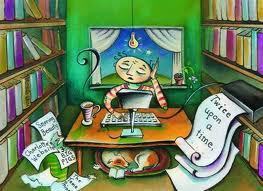 Once upon a time when I told people I was a writer they sighed longingly and mentioned The Book buried in their hearts that they didn’t have time to write. These days, knowing their book will be read by someone, they’re somehow finding the time, not only to write but to post news of their book on zillions of websites. In the novel The Best Seller by Olivia Goldsmith (of First Wives Club fame), a character based on Jacqueline Susanne throws a tantrum every time another professional—doctor, lawyer, carpenter—hits the best-seller list with a book. She doesn’t suddenly decide to perform brain surgery; why must every professional horn in on her territory? Those people who used to sigh longingly have stopped sighing. They’ve gone to work, content—or dare I say arrogant?—in the certainty that their book will reach the reading public.
Once upon a time when I told people I was a writer they sighed longingly and mentioned The Book buried in their hearts that they didn’t have time to write. These days, knowing their book will be read by someone, they’re somehow finding the time, not only to write but to post news of their book on zillions of websites. In the novel The Best Seller by Olivia Goldsmith (of First Wives Club fame), a character based on Jacqueline Susanne throws a tantrum every time another professional—doctor, lawyer, carpenter—hits the best-seller list with a book. She doesn’t suddenly decide to perform brain surgery; why must every professional horn in on her territory? Those people who used to sigh longingly have stopped sighing. They’ve gone to work, content—or dare I say arrogant?—in the certainty that their book will reach the reading public.
Inevitably with such a huge backlist, a lot of trash finds its way into the mix. Bad grammar, incorrect punctuation, and misspellings abound. Completing and publishing a novel used to be perceived as a major personal accomplishment. Imagine, after a multitude of rejections, what Marge Piercy must have felt like when Small Change appeared in bookstore windows. Yes, we had bookstores back then—in fact, it was in Borders that I got the first hint of the coming onslaught. When big box chain stores began popping up in every strip mall and big city, stores that actually placed chairs near the shelves for leisurely reading, I expected to feel like I was in the Garden of Eden, but the first time I went into Borders I had a panic attack. I felt like rushing home immediately to read, afraid I’d never catch up. On the heels of panic came a plunge into hopelessness: The world does not need anymore words, least of all mine. It was all too much for me; there were simply too many books.

I suppose it’s the baby boomer boom—too many of us reached the age of creative invention at the same moment in time. I’ve lost all sense that being published is a great accomplishment. I no longer care very much if a book I write gets published. At this point it would hardly matter, practically speaking: It’s not like I have that many years left to live out my dream. I still love to write, and I’ve been fortunate to have published quite a bit other than novels—in newspapers, magazines, anthologies, poetry journals, and on my blog—so I’m not half-crazed with frustration and a burning need to share my work. The only area in which I haven’t filled that need just happens to be my deepest passion: I bought the Great American Myth that The Great American Novel is the brass ring you grab as the merry-go-round turns.But if everyone has a brass ring, it’s not as meaningful. If publishing a book is the latest hot trend, count me out.
Related articles
Thoughts on Indie Publishing (richardewald.com)
Smashwords! (ttescurel.wordpress.com)
Filed under: Current Events, Feminism, Rants, Writing Tagged: Book, Doris Lessing, Ernest Hemingway, Henry Miller, Marge Piercy, Olivia Goldsmith, Renaissance Books, Smashwords

November 8, 2013
Blood Sisters

Alachia GoodReads (Photo credit: alachia)
My Young Adult novel-in-progress, Blood Sisters, is posted on Goodreads , sending out an SOS, or rather, in need of reader feedback. This is my first attempt in the YA genre, so I’m particularly concerned about voice; that is, that the first-person teenage narrator come off as believable. Another concern I have is whether the tone seems right for readers of, say, 14 to 18. Since the story takes place 40 years ago, I’m hoping to capture that time period, and that contemporary readers get the differences in social attitudes, yet can still relate to the lives, the feelings, and the situations of the characters.
These are some specific concerns of mine, but feel free to ignore them completely and comment on anything that strikes you about the book. I’m seeking any kind of reader reaction.
As of today, November 8th, the first two chapters are up. I’ll be adding more soon. I greatly appreciate your interest in my writing and can’t wait to see your responses to this work-in-progress.
Blood Sisters by Marcy Sheiner, a YA Novella In Progress
Filed under: Writing Tagged: Arts, Blood Sisters, Books, fiction, Goodreads, Literature, Reading

October 28, 2013
Sisterhood in the Novels of Jane Austen
Part One
In every Jane Austen novel—they total six—the heroine has at least one biological sister, sometimes a whole slew of them. In addition to blood relations, many a heroine has—or gains in the unfolding plot—a sister-in-law or two, referred to as sisters with no qualifying laws. Additionally, a few girlfriends are usually on hand to give us more of the dynamics of relationships among women. It’s safe to say that the theme of sisterhood was of some importance to Austen.
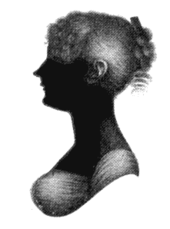
Cassandra Austen
Wikipedia
Austen herself had one sister: Cassandra Elizabeth, her senior by two years. She and Jane were the only girls among eight siblings; amid so much testosterone, they kept each other close, and remained best friends and confidantes throughout their lives. Over 100 letters from Jane to Cassandra survive, and have assisted historians and biographers constructing the details of Austen’s life. In some ways Jane seems to have been a typical younger sister; their mother once noted, “If Cassandra’s head had been going to be cut off, Jane would have hers cut off too.”
No wonder that in Austen’s first novel, Sense & Sensibility, the relationship between Maryann and Elinor, grown sisters, is central. Oh, sure, the plot revolves around the bumpy road to love and the men they hope to marry—but the sisterly relationship carries the emotional weight of the story, more than all their love affairs combined. Though devoted to their baby sister Margaret as well as to their mother, Maryann and Elinor are each other’s primary relationship in life. Nowhere is this more evident than during Maryann’s illness; as she hovers on the brink of death, Elinor prays and pleads: “Do not leave me here alone.”
Maryann spends most of her time enjoying—some say wallowing—in sensory reactions to the world around her. She frequently mocks Elinor for being, in her estimation, far too sensible—which in Maryann’s worldview means stodgy. After her devastating affair with Willoughby, however, and her return to good health, she comes to see her big sister much differently, and examines her own behavior in a harsh and glaring light. She confesses to Elinor, somewhat as apology, that she’s ashamed when she compares her behvavior to her sister’s lonely fortitude under similar tribulations, and finally sees her as a worthy role model.
Though the demonstrations of love and tenderness between Elinor and Maryann are rarely exhibited in contemporary relationships, their sisterly dynamics are familiar to modern readers. Jane Austen’s insights, rendered two centuries ago, still hold the ring of truth.
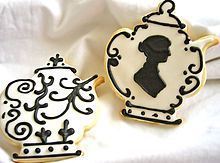 Pride & Prejudice—In Austen’s second book she pulls out all the sister stops, giving us the five–count ‘em, 5!—Bennett sisters: Jane, Lizzy, Lydia, Kitty and Mary, who range from early teens to 20′s. To spice up the pot, she adds Lizzy’s best friend Charlotte, and a pair of sisters the likes of which haven’t been seen outside of Cinderella (the Bingleys), who sabotage their brother Charles’ love affair with Jane Bennett at every turn.
Pride & Prejudice—In Austen’s second book she pulls out all the sister stops, giving us the five–count ‘em, 5!—Bennett sisters: Jane, Lizzy, Lydia, Kitty and Mary, who range from early teens to 20′s. To spice up the pot, she adds Lizzy’s best friend Charlotte, and a pair of sisters the likes of which haven’t been seen outside of Cinderella (the Bingleys), who sabotage their brother Charles’ love affair with Jane Bennett at every turn.
While Austen doesn’t delve deeply into each of the sisters’ relationships with one another, she’s the kind of writer who imparts a great deal of information about her characters with elegant economy, painting a full and vivid picture. The elder sisters, Jane and Lizzy, are close, like the real-life Jane and Cassandra. Both are sensible girls, especially compared to their mother and younger sisters. Jane sees the best, and only the best, in people, while Lizzy is much more discerning, and mentally sharper than any one of the Bennetts, including her intellectual father, who’s clueless when it comes to relationships among humans. Lydia would be considered a slut even by today’s standards, though not so harshly judged for it; Kitty’s the stereotypical kid sister who trails and emulates Lydia. Mary, the youngest, is possibly the only brainiac character in history without a brain. She escapes their chaotic family life holed up in her room studying, emerging on rare occasions to exhibit her questionable talents and deliver philosophical opinions. Each sister manages, in her own way, to publicly mortify Jane and Lizzy, outdone only by their mother, who talks about people right in front of them, and blurts inappropriate announcements and impertinent questions.
Mr. and Mrs. Bennett are without parenting instincts or skills. Each makes no secret of their favorite child: Mrs. B. adores Lydia for her gay, party personality, while Papa B. favors Lizzy for her intelligence and wit. Austen doesn’t say how the girls feel being aware of this, but it might be partly responsible for much distress and confusion.
When Lydia scandalizes the Bennetts by running off with the dastardly Mr. Wickham, she gloats as if it were a great accomplishment. In the 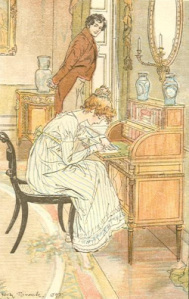 recent past Lizzy had herself been enamored by the same man, before learning of his disreputable character. Knowing what we do of sisterly competition, we have to wonder if Lydia boasts so immodestly for managing to snag a man once prized by an older sister. Having no real knowledge of Lizzy’s reasons for turning against Wickham, she might even assume Lizzy still cares for him. A baby sister trumping one several years her senior—now that is an accomplishment!—or at least it is to a girl who, while favored by her mother, never won the same from her father, who reserved that position for Lizzy, turning the two of them into unspoken rivals.
recent past Lizzy had herself been enamored by the same man, before learning of his disreputable character. Knowing what we do of sisterly competition, we have to wonder if Lydia boasts so immodestly for managing to snag a man once prized by an older sister. Having no real knowledge of Lizzy’s reasons for turning against Wickham, she might even assume Lizzy still cares for him. A baby sister trumping one several years her senior—now that is an accomplishment!—or at least it is to a girl who, while favored by her mother, never won the same from her father, who reserved that position for Lizzy, turning the two of them into unspoken rivals.
That’s just a smidgen of the sisterly dynamics among dozens in P&P, but to analyze them all is beyond the scope of this blog. Time to go to…
Mansfield Park. This is Austen’s third novel, deemed a literary comedown by most critics and fans after the miracle of Pride & Prejudice. Here is yet another retelling of the Cinderella story, played out in hundreds of movies, plays and novels across time and cultural variations. Fanny Price is the girl in the cinders of Mansfield Park, dragged out of her dirt-poor family home to be raised by wealthy relatives, who imagine themselves magnanimous. Cousins Maria and Julia stand in for the wicked stepsisters. Sir and Mrs. Bertram are too clueless or lazy to play stepmother, but not to worry: Aunt Norris is, conveniently, a secret sadist next to whom the typical fairy-tale stepmother appears angelic. Fanny’s fairy godmother is Mary Crawford; unfortunately, she fails to recognize her as such. Worse yet, Fanny mistakes the younger Bertram son, Edmund, as her Prince Charming just for being kind to her. Meanwhile she lets the real Prince—Henry Crawford—slip right though her fingers.
In Mansfield Park female competition for male attention is overt: Maria and Julia, normally close, both fall in love with Henry Crawford, giving rise to jealous hostility and almost open warfare. Similarly, Fanny and Mary Crawford are both in love with Edmund. Mary, being unaware of Fanny’s feelings for him, extends genuine sisterhood to her; Fanny is, however, engaged in a life-and-death battle for Edmund’s heart, and cannot reciprocate.
[image error]
London: George Allen, 1894. (Photo credit: Wikipedia)
It’s not just love for Edmund that interferes with Fanny’s ability to form a friendship with Mary: abused by Aunt Norris and belittled by her girl cousins, Fanny harbors a deep distrust of women, and might never be able to form any decent sisterly relationships. She does extend herself to a younger sister when visiting her birth family, but exhibits little love towards the girl, particularly compared to her feelings and behavior towards her brother William.
End Part One. Sisterly connections in Emma, Persuasion, and Northanger Abbey will be analyzed in Part Two.
Related articles
Does the World Need Another Jane Austen? (teleread.com)
Will The Real Jane Austen Please Stand Up? (marcys.wordpress.com)
Revisiting Austen’s Tale of Two Sisters, Marianne and Elinor in ‘Sense and Sensibility” (Review) (popmatters.com)
Mansfield Park by Jane Austen (thebookstop.wordpress.com)
Filed under: Feminism, Literature, women, Writing Tagged: Arts, Books, Feminism, fiction, Jane Austen, Literature, Mansfield Park, Pride & Prejudice, Sense & Sensibility

October 20, 2013
MY Woodstock
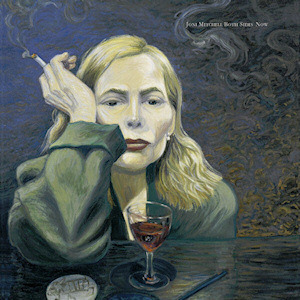
Both Sides Now (Joni Mitchell album) (Photo credit: Wikipedia)
I posted this change-of-lyrics written several months ago, and ran across it in my files again today, with a different ending, so I decided to re-post. Also, it tickles me!

Marcy in Woodstock
My Woodstock
(with apologies to Joni Mitchell)
I fell in with a fugitive
who was runnin’ from his family.
And I asked him where are you goin’
and this he told me:
He said I’m goin’ to the country
I’m goin’ to hide out on the land

All photos on Joni’s website
I can’t pay child support
or alimony.
We were outlaws.
We were mothers.
We were writers, we were hippies
and musicians.
Then can I please go with you?
I will pay my way and yours
and we’ll take my kids up with us
to Utopia.
It’s time for me to start to live
and it is the Time of Woman
tho I don’t know who I am
or how I got here.
We were outlaws
We were hippies
We were feminists
musicians and writers.
By the time we hitched to Woodstock
We were sick and tired and broke
and rents began to rise
with all the tourists.
So the hippies opened chachka shops
and they gave the writers jobs.
The musicians
and the feminists got married.
Some outlaws fled to Berkeley
and some got thrown in jail
and me I just kept pounding
on my typewriter.
And now I am a senior
at an age they say is golden
and the outlaws and the hippies
they are all gone.
And a Happy Birthday to Joni Mitchell, who turns 70 November 7th.
Related articles
Costumes in History: Hippies and the 1960s (wholesalehalloweencostumes.com)
Spotlight: Joni Mitchell (woodstockwardrobe.com)
Howard Stern’s interview with Graham Nash (eyesofmyworldaz.wordpress.com)
Filed under: Musings Tagged: Arts, Hippie, Joni Mitchell, Musician, Woodstock

October 15, 2013
Baseball Season Winds Down…or Up For Some
Baseball Season Winds Down…or Up For Those Who Only Watch Post-Season Games
I never thought I’d utter such heresy, but for the New York Yankees the 2013 season was the worst in recent memory, and stats will no doubt prove it. Talk about injuries! The dugout in the Bronx was like the Emergency Room at Bellevue. Every time a supposedly healed player returned, another one went down—and sometimes, as in the case of Captain Jeter and his stubborn ankle, the same guy came and went the same day. These guys probably had more emotional pain than physical. I sure did.
When the Mets swept the Yanks in a four-game series, they had the grace and humility to recognize they hadn’t actually swept the Yankees, but, as I came to call them, a bunch of Strangers on the Field. In fact, the thrown-together, ragtag, rotating players did pretty well considering their experience and team cohesion, or lack of both. They fought bravely to the last, nearly making it to the playoffs as a wild card—but didn’t.
And now the Playoffs. As noted up above, some people don’t even watch baseball until things heat up for the post-season. Players pull out all the stops come October, and the games are their most exciting. Each year, it seems, more and more teams compete to get into the World Series, as MLB comes up with more new ideas to make it happen, crowding the field with more wild cards than a poker game among six-year-olds.
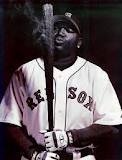 Now we’re down to just four teams, two from each league, both in the midst of the semi-final battle. In the National League it’s the LA Dodgers and St. Louis Cardinals, while in the American League it’s the Boston Red Sox and Detroit Tigers. I care more about the American League, given who’s playing, but I don’t care so much who wins as I do who should not win. Which is obvious: as a Yankee fan I’m fervently hoping the Sox go down soon with as much humiliation as possible (with the exception of Big Papi–one of my favorite players, he’s allowed to do well as long as he doesn’t win it for them). This year in particular, after what the Yankees and their fans have been through, it will be devastating if the Sox take the WS title. Besides, the only bright spot in the whole of a bankrupt, dying Detroit is their baseball team. So go Tigers! Whip their butts! Whip ‘em good!
Now we’re down to just four teams, two from each league, both in the midst of the semi-final battle. In the National League it’s the LA Dodgers and St. Louis Cardinals, while in the American League it’s the Boston Red Sox and Detroit Tigers. I care more about the American League, given who’s playing, but I don’t care so much who wins as I do who should not win. Which is obvious: as a Yankee fan I’m fervently hoping the Sox go down soon with as much humiliation as possible (with the exception of Big Papi–one of my favorite players, he’s allowed to do well as long as he doesn’t win it for them). This year in particular, after what the Yankees and their fans have been through, it will be devastating if the Sox take the WS title. Besides, the only bright spot in the whole of a bankrupt, dying Detroit is their baseball team. So go Tigers! Whip their butts! Whip ‘em good!
As for the National League, I’m not fond of the Dodgers and their violent fans, one or more (the perpetrator still hasn’t been caught) of whom severely beat up a Giants fan on opening day two years ago, compromising the workings of his brain. Before an LA fan jumps in here to deliver the news that a Dodger fan was recently murdered on a San Francisco street—I know this. So? It doesn’t lessen the vileness of the first incident or make it right. Let’s hope these crazy morons call it even, and the guy didn’t die entirely for nothing.
The other 2013 story, in the Bronx if not in all of MLB—no, it isn’t A-Rod and his steroids and lawsuit–it’s Mariano Rivera’s season-long farewell. It was such a heartwarming event, or series of events, it almost made us forget what else was going on. Rivera is probably the only player in all of baseball who’s respected and even loved universally. The gifts, the accolades, the notes, the speeches, the donations to Rivera’s charity—every time the Yanks showed up in another city, we got another wonderful story, like the Chair of Broken Dreams or Mariano as Pizza Man delivering to stadium staff. What a trip! What a guy! This is one player who is irreplaceable, and will be greatly missed. So will Andy Pettite, who only announced his retirement a few days before the season closed. Maybe he didn’t want to steal Mariano’s thunder…but Pettite’s also well regarded throughout baseball. Remember the Core Four? Jeter, Posada, Pettite and Rivera—they played together for something like 18 years. And now there is one. I sure hope his ankle heals by next season!
As my son, a diehard Mets fan says every October, Wait until next year! This is the first time I’ve been forced to say it. Come on, all you broken-hearted Yankee fans. Take a deep breath. Repeat after me:
WAIT UNTIL NEXT YEAR!
People ask me what I do in winter when there’s no baseball.
I’ll tell you what I do.
I stare out the window and wait for spring.
~Rogers Hornsby
Related articles
Mariano Rivera Day Honors Final Game For Yankees’ All-Star Closer (ny1.com)
Op-ed: Dodgers, Yankees, and Sexual Fluidity (advocate.com)
Filed under: Baseball, Musings Tagged: American League, Boston Red Sox, Bronx, Mariano Rivera, National League, New York Yankees, San Francisco, World Series

October 14, 2013
Cheryl Marie Wade
Cheryl Marie Wade
A Sassy Juicy Poster Girl Gone Awry
March 4, 1948 – August 21, 2016
At a memorial for Cheryl Wade, or celebration of her life, held on the UCBerkeley campus yesterday, four or five of her close friends offered memories of her and their friendship that moved me to tears. Cheryl was one of those people that others, myself among them, sometimes envied for her wide circle of devoted friends. They came from the different areas of her life, each fitting into another aspect of her many-faceted personality, art, and work. With one she went to Broadway musicals (and later acted them out); with another she organized performances, and so forth and so on. She was almost always authentic: she didn’t hide her anger for fear of alienating people, or bury resentment under fake smiles. She was a political activist who placed her art above and beyond any message, yet delivered a heartfelt message every time.
“I want my art to be so good that someone who doesn’t give a damn about disability comes to see me because I’m good,
and goes away with a new consciousness about disabled people.”
I met Cheryl the way I met a lot of people in the Bay Area: interviewing her for a newspaper story. I keep trying to remember where I first heard of her, how she showed up on my radar in the first place, but I still haven’t figured it out. It would’ve been logical to see one of her shows and want to write about her, but I didn’t see her perform until after we met. Cheryl onstage was inspiring, and had I seen her there first I know I would’ve asked for an interview. But she was just as inspiring off stage as on, and interviewing her was one of the high points of my journalism career. The high lasted quite awhile, as I interviewed and wrote about several other disabled performers after her. Disability culture is, in a word, HOT! As Cheryl once told me, “The gift of disability is the experience of not taking physical or mental abilities for granted.” She exemplified this idea, as usual, in poetry:
Do you walk?
Do you feel your muscles tighten?
Do you drag bare feet through warm shag carpet?
Do you feel the muscle in back of your right calf
tightening and loosening,
tightening and loosening?
Do you walk?
My absolutely favorite of all Wade’s poems is Not a Reason To Die, which she wrote after reading an editorial by an able-bodied man proposing that people with certain levels of disabilities be allowed to die.
I’m trickster coyote in a gnarly-bone suit
I’m a fate worse than death in shit-kickin’boots
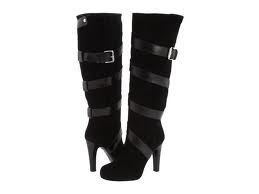 I’m the nightmare booga you flirt with in dreams
I’m the nightmare booga you flirt with in dreams
‘Cause I emphatically demonstrate: It ain’t what it seems
I’m a whisper, I’m a heartbeat, I’m “that accident,” and goodbye
One thing I am not is a reason to die.
I’m homeless in the driveway of your manicured street
I’m Evening Magazine’s SuperCrip of the Week
I’m the girl in the doorway with no illusions to spare
I’m a kid dosed on chemo, so who said life is fair
I’m a whisper, I’m a heartbeat, I’m “let’s call it suicide” and sigh
One thing I am not is a reason to die.
I’m the poster child with doom-dipped eyes
I’m the ancient remnant set adrift on ice
I’m that Valley girl, you know, dying of thin
I’m all that is left of the Cheshire Cat’s grin
I’m the Wheelchair Athlete, I’m every dead Baby Doe
I’m the Earth’s last volcano, and I am ready to blow
I’m a whisper, I’m a heartbeat, I’m a genocide survivor and Why?
One thing I am not is a reason to die.
I am not a reason to die.
“I’ll be damned if I’ll let anyone judge this life as not quality.
Thousands of non-disabled people would be very fortunate to have my life.”
She was right. She was sassy. She was juicy. She was brassy.
RIP Cheryl. You will be missed.
Cheryl Wade Must-See’s:
Disability Culture Rap Part II
Thank You Cheryl Marie Wade: A You Tube channel where anyone can visit or contribute.
For info on uploading your own video contact: ThankYou CMW@gmail.com.
Related articles
In Memoriam: Cheryl Marie Wade (osduchicago.wordpress.com)
Young disabled lack the basic necessities (independent.co.uk)
Filed under: Disability, performance, Poetry, political theater Tagged: Arts, Cheryl Marie Wade, Cheryl Wade, Disability, Disability culture, obituary, Performance Artist

October 11, 2013
Shameless Self-Promo
It’s about time, I’ve decided, that I inform or remind readers of my books for sale, what with a new one just published and another one making the rounds.
Note: As many of you no doubt know, I’ve edited a dozen anthologies of women’s erotica. In case you’re wondering why they aren’t listed here, the reason is simple: I edited those books, and these are books I wrote. Completely. Entirely. To view the erotica, as well as books to which I’ve contributed, see my Publications List.
A collection of short stories on love, friendship, joy, pain, breakups and commitment. The stories in Love and Other Illusions, while not explicit, vibrate with passion as they explore topics like the complexities of women’s relationships with men and with each other, the tragicomedy of STDs, and even adultery among a pair of octogenarians. Ebook available at Rennaissance Books, and as an Amazon Kindle.
New Low Price! $0.99
“What a strange new world I’ve come to, where the highest holy days honor masturbation and homosexuality.”
So ponders Rachel Max, a reporter from Vermont who migrates to San Francisco on a quest for adventure, work, and love, not necessarily in that order. As editor and writer for a sex-positive journal, it’s Rachel’s job to spin every story into an upbeat celebration. Walk with Rachel through the wilder streets of San Francisco, into the houses, flats, motels, and lofts where sex adventurers and radicals gather for parties, salons, hot talk and hotter action. Available on Smashwords.
 Sex for the Clueless:
Sex for the Clueless:
How to Enjoy A More Erotic and Exciting Life
My sexual self-help book—every writer has one!—came out in August 2001. Ring any bells? By the time I had copies in hand and was ready to do readings, it was post-9/11 and nobody cared about sex—or at least books about sex; all they wanted to learn and read about was Islam. I’m lax enough about doing publicity; between that and the timing, Sex for the Clueless was swiftly relegated to the crowded warehouses of ignored books. Better late than never! Clueless is still available on Amazon, and it’s well worth a read (say I modestly), as these reviews testify:
“ I bought this book at my local bookstore and it’s wonderful! Funny, informative and downright clever. It’s the best new sex guide I’ve read in a long, long time.”
“A wonderful book! although it did not teach me about sex (this i know already) it did help me feel more comfortable talking about sexuality with my children. I want them to grow up confident and at ease with their sexual side, and while i wouldn’t go into all the details found in these pages with them, I would certainly keep those very important lines of communication open.”
 Perfectly Normal:
Perfectly Normal:
A Mother’s Memoir
Who says you can’t write about sex and motherhood? A lot of people in the publishing industry, that’s who. Ridiculous! said I, and as soon as online self-publishing came to my attention I put my story up (written many years previous) on iUniverse’s Disability Press, at that time free for those of us writing on the subject. Perfectly Normal tells of my early years as the mother of a child born with a chronic medical condition.
It was 1965 when Daryl was born with hydrocephalus, a neurological disorder in which spinal fluid accumulates in the head, causing abnormal growth and other problems, sometimes even brain damage. A surgical procedure kept him alive, and, now 48, he lives independently.
1965: The comparatively Dark Ages for people with disabilities. I was just nineteen; like most mothers of children with disabilities, I had to learn motherhood while bombarded by self-blame, denial, fear, and resentment. I was confronted with a woefully inadequate medical profession, an educational system devised to meet the needs of “normal” children only, and the so-called helping professionals who marched through my life uninvited. This life experience radicalized me with regard to social attitudes and treatment of people with disabilities; by the time Daryl reached adulthood I was writing about the growing Disability Rights Movement. In Perfectly Normal and elsewhere I wrote not only about my personal difficulties, but also social injustice. I purposely told my story without offering the balm of fake “inspiration” or an uplifting message. I told the truth.
Available as paperback or e-book on iUniverse and Amazon.
Blood Sisters
This is the book I said was “making the rounds”—of publishers, that is. Blood Sisters is my first foray into the genre of Young Adult books, so I’m looking for feedback. If anyone wants to provide some, I’ll email the book up until mid-November. I don’t expect or need intense, detailed commentary, just your general impressions. Send your email address by the end of October to msheiner07@gmail.com. An excerpt of the first chapter is on my blog–but it’s changed quite a bit since then.
Related articles
The Economics of Self-Publishing an E-Book: Part 1 (mint.com)
Just do it. (breezybooksblog.wordpress.com)
Filed under: Literature, Publishing, Writing Tagged: Arts, Books, fiction, Literature, San Francisco, Writing

October 2, 2013
Will The Real Jane Austen Please Stand Up?
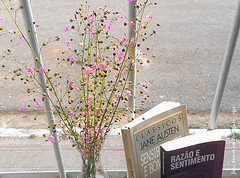
Jane Austen & Flores (Photo credit: Jane Austen in Portuguese)
Bitch In a Bonnet: Reclaiming Jane Austen From the Stiffs, the Snobs, the Simps and the Saps (Volume 1), Robert Rodi
Jane Austen seems to be the kind of writer who’s never taken literally, but is interpreted, misinterpreted, and reinterpreted from different angles depending on who’s doing the interpreting. Austen’s books challenge readers to seek out her “true” intentions. On the surface, most readers see her as the premier author of the “Regency Romance,” an early form of chick-lit. In one Austen chat room I stumbled into, the gals were ranting and raving, ready to castrate some guy who said Sense & Sensibility is no great romance, Madam! Apparently the romantic contingent is quite attached to their viewpoint.
In a blog devoted to Jane that’s written by a whole bunch of alternating writers, one of them asks whether Austen is a sensitive Romantic or a sensible Pragmatist. At this point I’m throwing my hat into the ring to proclaim Jane Austen a social critic, and an excellent one at that. I vaguely thought all along that this was her strong suit, and now my opinion has been reinforced by Robert Rodi’s impressive and eminently entertaining Bitch In a Bonnet: Reclaiming Jane Austen From the Stiffs, the Snobs, the Simps and the Saps (Volume 1). I’m only two-thirds through, but Rodi is so convincing he had me by Page 3. Chapter by chapter he critiques Sense & Sensibility, Pride & Prejudice, and Mansfield, in that order. I intend to re-read P&P (my 3rd go-round) before I move on to Mansfield, to see if I think his theory still holds up.
 Even if it doesn’t, I love Bitch In a Bonnet for Rodi’s writing style if nothing else. He lets it rip, going for the jugular through the use of slang, sarcasm, and the darkest humor he can find; for instance, he repeatedly takes swipes at Jane Bennet for her optimistic, sickeningly sweet opinions of people no matter how dastardly their deeds. If he isn’t wanting to strangle her she’s getting bopped on the head by Lizzy Bennet–in his fantasies only, of course. At times this over-the-top swashbuckling gets to be a bit much, and exerts something like the pressure I feel when I’m with someone who’s perpetually “on.” Luckily, I don’t have to interact with Rodi, so it isn’t s that much of a burden.
Even if it doesn’t, I love Bitch In a Bonnet for Rodi’s writing style if nothing else. He lets it rip, going for the jugular through the use of slang, sarcasm, and the darkest humor he can find; for instance, he repeatedly takes swipes at Jane Bennet for her optimistic, sickeningly sweet opinions of people no matter how dastardly their deeds. If he isn’t wanting to strangle her she’s getting bopped on the head by Lizzy Bennet–in his fantasies only, of course. At times this over-the-top swashbuckling gets to be a bit much, and exerts something like the pressure I feel when I’m with someone who’s perpetually “on.” Luckily, I don’t have to interact with Rodi, so it isn’t s that much of a burden.
Although I said Rodi has me convinced, that’s only while actually reading his book–I don’t want to fully commit for or against his case until I’ve done more re-reading and re-thinking. For now, though, based purely on my own impressions, I have to admit that My generation did not invent the feminist novel! I don’t know if anyone got there before Jane Austen, but she definitely gets a prominent seat at the table. She has shown us British life and a class-based society from the point of view of its effect on women, primarily, the economic disadvantages under which they lived. She has laid out the whole system of the inheritance laws and the practice of entailment, which kept women poor and utterly dependent on their
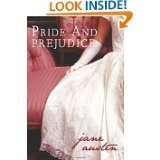 husbands–and woe to the woman who didn’t find one of those creatures to protect and defend her for life. In addition, Austen was exquisitely attuned to hypocrisy-or as Rodi might put it, she had a highly developed bullshit detector. She knew what people thought and meant beneath their false words and fake smiles. She might have been a misanthrope who sought out the worst in human nature and therefore found it, but even if that was the case, there’s no denying that what she exposed was real.
husbands–and woe to the woman who didn’t find one of those creatures to protect and defend her for life. In addition, Austen was exquisitely attuned to hypocrisy-or as Rodi might put it, she had a highly developed bullshit detector. She knew what people thought and meant beneath their false words and fake smiles. She might have been a misanthrope who sought out the worst in human nature and therefore found it, but even if that was the case, there’s no denying that what she exposed was real.
Romance? Most of her couplings are based on the man’s income and the woman’s countenance and connexions (that’s how she spells it). What can her relatives and friends do for him and their future? Will their status go up or down according to that of her family?
By their lack of parental discipline the Bennet parents allow their youngest daughter to behave in a way that might doom the two eldest to perpetual spinsterhood. A girl’s chances of matrimony can be ruined by her baby sister traveling with a dastardly villain (Lydia Bennet and Mr.Wickham) without first respectably marrying, for shame! Yes, it’s absurd–but it is the way things were. I dare to venture that perhaps some of today’s taboos will some day be regarded as similarly absurd by a more enlightened generation. We can only hope.
Related articles
“We really do inhabit the novels”: An Interview with Elaine Bander, President of JASNA Canada (sarahemsley.com)
10 Jane Austen oddities in popular culture (englishatwaterloo.wordpress.com)
Filed under: Literature, Musings, Review, writers, Writing Tagged: Jane Austen, Jane Bennet, Mansfield Park, Pride & Prejudice, Regency Romance, Robert Rodi, Sense & Sensibility

September 24, 2013
RIP Cheryl Marie Wade
I have just this minute learned of the death of Cheryl Marie Wade on August 21st. I will be writing more later, but meanwhile wanted to get this up:
UPCOMING EVENT – PLEASE PUBLICIZE
Sunday, October 13, 2-5 at Alumni House, UC Berkeley.
Please join us in a tribute to the life and work of Cheryl Marie Wade,
who passed away on August 21, 2013. Wade was internationally renowned
as a playwright, poet, performer, filmmaker and disability activist,
the “queen mother of gnarly.” She was cherished among us as a dear
friend and beloved partner.
Refreshments and drinks will be served.
Here is a link to directions to the Alumni House on the Berkeley campus:
http://alumni.berkeley.edu/about-caa/visit-alumni-house
For further information please contact CDT at
info@culturedisabilitytalent.org or Susan Schweik at
sschweik@berkeley.edu.
This event is wheelchair accessible. ASL interpretation will be
provided. Please refrain from wearing scented products.
For other mobility or communications accommodation requests and
information please contact Danny Kodmur at dkodmur@berkeley.edu 510
643-6456 Voice 510 642-6376 TTY
I have written more about Cheryl here.
Related articles
In Memoriam: Cheryl Marie Wade (osduchicago.wordpress.com)
Filed under: Disability Tagged: Cheryl Marie Wade



